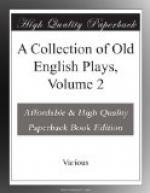Fra. Although I mist a happines, I applaud Your nimble wit that securd both our honours. You have an excellent Instrument too o’ your gentlewoman.
La. Oh she deliver’d to the life
how you
Were troubled with the Stone. At first I did
Beleev’t my selfe, and thinke of the sad consequence.
But tyme is pretious now: although our Starres
Have not been yet propitious to our meeting
Ile try my art to night to make ’em shine.
With happie influence on our Loves.
Fra. Most excellent Madam, how?
La. Ile not engage Your visit to my chamber, since the first Prov’d so unfortunate, but come to youres.
Fra. This night? wonot your husband be at home.
La. Yes.
Fra. You enjoy but one bed.
La. Without witchcraft, sir,
I have a stratageme to delude my husband
And all his jealous waking eyes, a plott
That cannot faile if you dare but expect me.
Fra. I grow immortall with my hopes and
fancie
More than the worlds most pretious Empire in
Our first embrace. I should runne back into
An Infant once agen, and by degrees
And tyme grow up to meet so vast a happines.
Ages in expectation spent were poore
And easy sufferings weigh’d against this triumph!
Methinkes I am not man but something of
A more exalted essence: humane nature
Hath not capacity to understand
And owne theis spatious blessings.
La. No more rapture;
But with the confidence of a lover spread
Your equall thoughts, and in your heart and armes
Prepare an entertainement for that guest
That hath no life or name but what you give.
A kisse! and leave our soules to thinke upon
The joyes this night attend us.
Fra. Sullen day, Do not tire now; tis downehill all the way.
[Exeunt severally.
Act the Fourth.
[SCENE 1.[260]]
[Captain,[261] Underwit, Courtwell
and Musicians,
discovered in the Tavern.]
Capt. Come, my Apollos, my Orpheuses or my Bacchus his Minst[rels], which, to leave poeticall expressions, in broader phrase is Taverne fidlers, some of your new tunes, my Masters; doe you heare?
1. Do you meane Mr. Adson’s[262] new ayres, Sir?
Cap. I, Sir; but they are such phantasticall ayres as it putts a Poet out of his witts to rhime to them; but let mee heare.
1 Play.
Capt. No, I doe not like that.
1 Play againe.
Capt. Nor that. (Play againe)—No, no, no, neither.
1. An’t please your Worship, Mr. Capt., our Boyes can singe songs to these.
Cap. No, no, saveing your presence, your
Boyes have nothing, sarreverence,[263] but Love songs,
and I hate those monstruously, to make thinges appeare
better then they are, and that is but deceptio
Visus, which after some embraceings the parties
see presently what it is.
The
Musique Playes.




